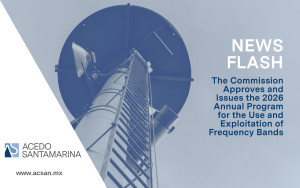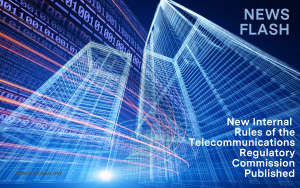On September 3, 2025, the Decree amending, adding, and repealing various provisions of the Internal Rules of the Digital Transformation and Telecommunications Agency (the “Amendment”) was published in the Official Gazette of the Federation (in Spanish, “DOF”). The Amendment entered into force on September 4, 2025 and, although at first glance it may appear to introduce significant changes, in reality it constitutes an expected and necessary adjustment. Below, we explain why.
On July 16, 2025, a legislative package concerning public security, antitrust, telecommunications, digitalization, among other matters, was published in the DOF. Within this package, two key decrees stand out: i) the Decree issuing the National Law to Eliminate Bureaucratic Procedures; and ii) the Decree issuing the Telecommunications and Broadcasting Law, which repealed the Federal Telecommunications and Broadcasting Law.
It should be recalled that the Internal Rules of the Digital Transformation and Telecommunications Agency (the “Agency”) had been published months earlier, on January 24, 2025. Consequently, once the new laws entered into force, it became necessary to amend the Internal Rules of the Agency to reflect the provisions set forth therein.
The Agency is a dependency of the Federal Executive created as a result of the Organic Simplification Reform published on December 20, 2024, through which various constitutional autonomous bodies were dissolved, including the Federal Telecommunications Institute (in Spanish, “IFT”).
Initially, the Internal Rules contemplated that the Agency would directly assume the IFT’s regulatory functions. However, the Telecommunications and Broadcasting Law established the creation of the Telecommunications Regulatory Commission (the “Commission”) as an administrative body deconcentrated from the Agency. Under this new institutional framework, the functions previously concentrated in the IFT are now divided between two entities: i) the Agency, responsible for the design and implementation of public policy; and 2) the Commission, responsible for technical regulation, operational oversight, and imposition of sanctions.
In parallel, the National Law to Eliminate Bureaucratic Procedures entrusts the Agency with the responsibility of designing a system to standardize and simplify government procedures and services, primarily through digitalization and the interoperability of databases across different authorities. Nevertheless, it will be essential to await the issuance of secondary legislation to define the specific guidelines under which the Agency must carry out this process. Such legislation will need to adopt a progressive approach that, in addition to streamlining administrative procedures, ensures respect for digital rights and the protection of citizens’ personal data.
Furthermore, since there is still no clarity regarding the transition period between the telecommunications and broadcasting authorities, it will also be necessary to await secondary legislation defining the rules that will guide the Commission’s practical operation.
In conclusion, the Amendment to the Agency’s Internal Rules does not constitute a substantive change: its sole purpose is to align the Rules with the provisions set forth in the Telecommunications and Broadcasting Law and the National Law to Eliminate Bureaucratic Procedures, both published on July 16, 2025.+
At Acedo Santamarina, S.C., we remain at your disposal to provide advice on the scope and implications of this new regulatory framework.





